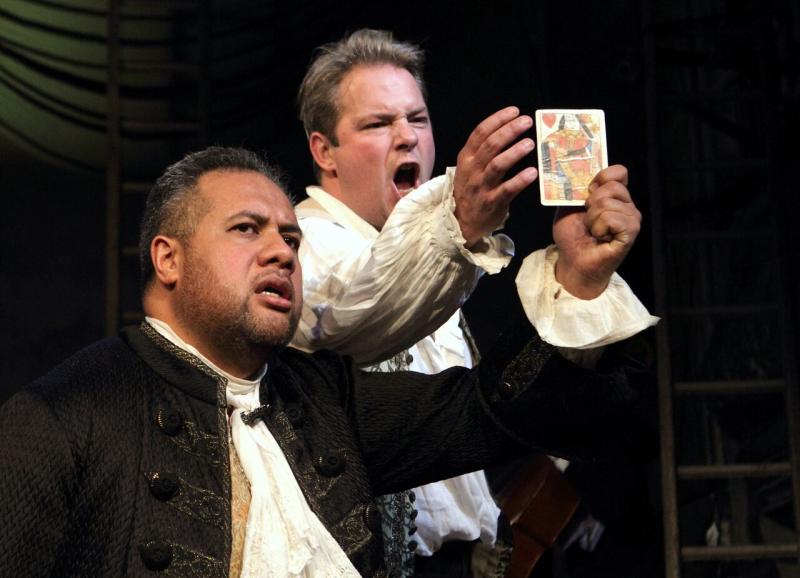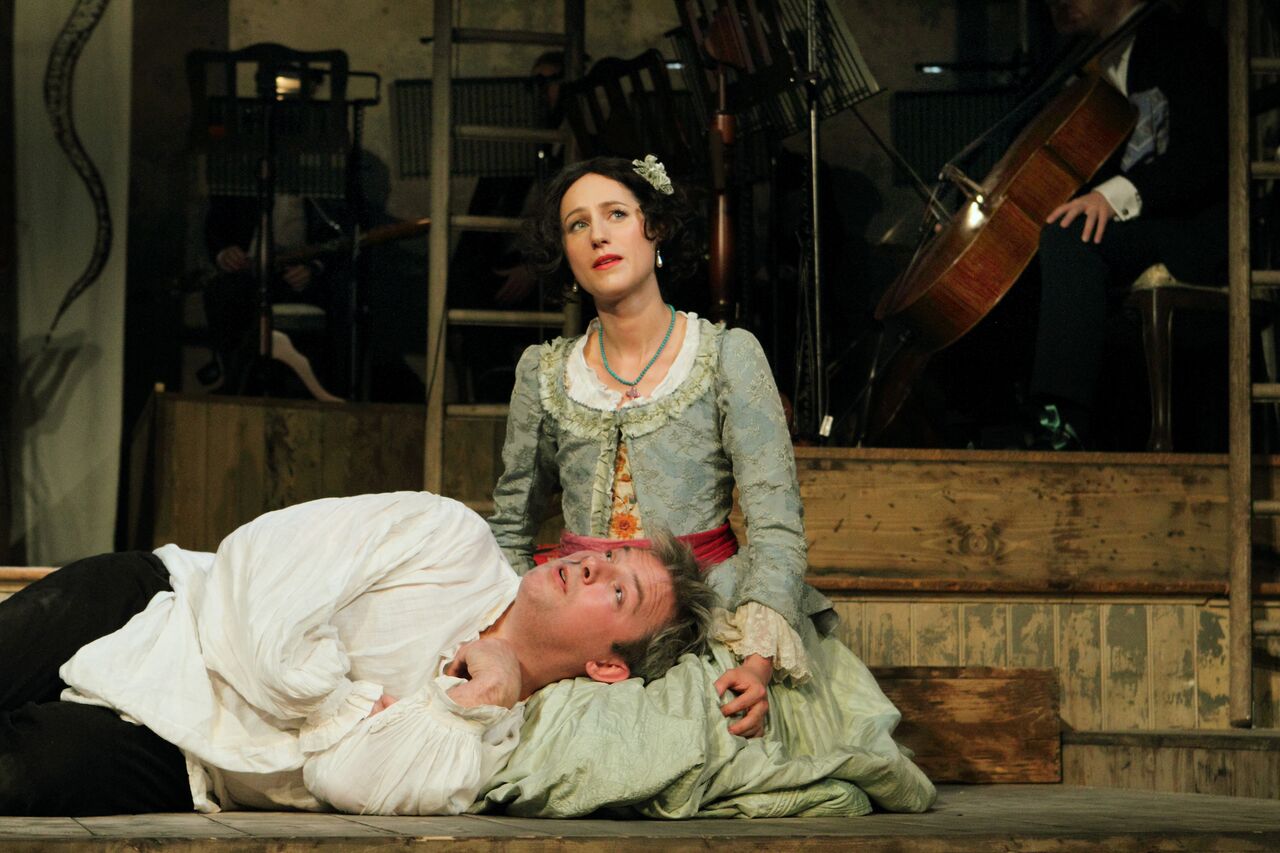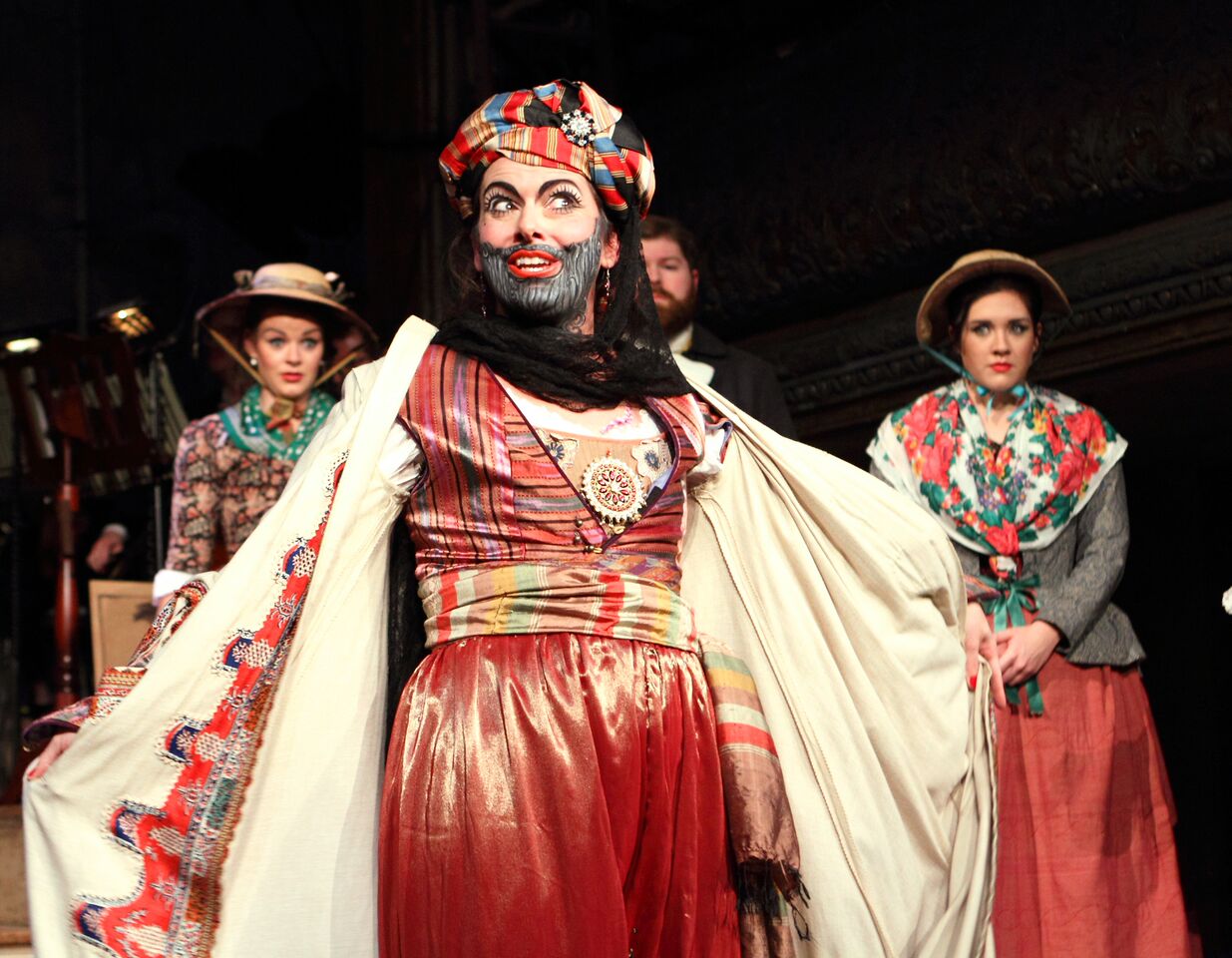The Rake's Progress, Wilton's Music Hall review - mercurial Stravinsky made cumbersome | reviews, news & interviews
The Rake's Progress, Wilton's Music Hall review - mercurial Stravinsky made cumbersome
The Rake's Progress, Wilton's Music Hall review - mercurial Stravinsky made cumbersome
Fine cast, but playing and production need both sharpening and lightening up

If you're not going to mention the imaginative genius of Stravinsky, Auden and Kallman within the covers of your programme, and the only article, by the director, is titled "Acting Naturally", then the production had better deliver.
I take one of Cadell's key points, that performers should engage more directly with the audience. In a work which starts with Stravinsky's typical inverted commas around the word "heart", only to glide into a terrifying earnestness beneath the facade by the time we reach the last two scenes as weak-willed Tom Rakewell finds himself first in a graveyard and then in a madhouse, that's a mixed blessing.
It's a sadness that the production Stravinsky treasured most, that by Ingmar Bergman in Stockholm, is lost to posterity, but we do have Bergman's Magic Flute, the greatest, surely, of all opera films, to hint at what might have been achieved: it starts with a pretty recreation of the Drottningholm theatre, all delightful painted flats and much addressing of the audience, but strips away the illusion in the second act. Stravinsky being equal to Mozart in his variousness, a similar sense that we're no longer asked to be directly complicit – with a bit too much "like me" about it for my taste last night – but finally inside the characters' heads was missing last night. Given an audience ready to titter at just about anything, and lights full up, the power of Nick Shadow's attempt to claim Tom's soul didn't stand a chance. A rigidly 18th century London with the occasional reference to Hogarth's series, though without wigs and only using minimal props – albeit with a nice touch in Cummings dressed up as his god, Mr Handel – fails to mark the full historical range of Stravinsky's musical mystery tour. Hockney at Glyndebourne got away with it; the Brechtian austerity of Tom Piper's sets and the splashes of colour in Rosalind Ebbutt's pretty costumes weren't enough. Several numbers delivered from the balconies were completely lost on the sizeable proportion of the audience seated beneath them.
Given an audience ready to titter at just about anything, and lights full up, the power of Nick Shadow's attempt to claim Tom's soul didn't stand a chance. A rigidly 18th century London with the occasional reference to Hogarth's series, though without wigs and only using minimal props – albeit with a nice touch in Cummings dressed up as his god, Mr Handel – fails to mark the full historical range of Stravinsky's musical mystery tour. Hockney at Glyndebourne got away with it; the Brechtian austerity of Tom Piper's sets and the splashes of colour in Rosalind Ebbutt's pretty costumes weren't enough. Several numbers delivered from the balconies were completely lost on the sizeable proportion of the audience seated beneath them.
Nor did those exquisite endpapers, a pastoral idyll at the start and a masque-like final catering for Stravinsky's deep myths of rebirth in Bedlam, have the eyes pricking as they can when the conducting is more deft, the instrumental lines more beautifully phrased than the young players of the Southbank Sinfonia were encouraged to make them (no problem at all, though, with the restricted forces). We did at least have two master colourists in tenor Robert Murray as Tom and Susanna Hurrell as his Anne Trulove (pictured above), though the sense of callow youth trying, however feebly, to find his way was lost in casting an older tenor. Jonathan Lemalu had light and shade in his singing, too, though perhaps not enough menace and authority. Even Victoria Simmonds as Baba the Turk (pictured above), the bearded lady of St Giles' Fair whom Tom is urged to marry as an existential jest, didn't get the best context from Cadell; was it health and safety which prevented any crockery from being smashed at such close proximity to the audience in her breakfast vengeance aria? Nevertheless much expressive use of her well-made-up eyes – pity the beard had to be a paint job – and full mezzo dudgeon gave the cue for the fullest laughter of the evening.
Jonathan Lemalu had light and shade in his singing, too, though perhaps not enough menace and authority. Even Victoria Simmonds as Baba the Turk (pictured above), the bearded lady of St Giles' Fair whom Tom is urged to marry as an existential jest, didn't get the best context from Cadell; was it health and safety which prevented any crockery from being smashed at such close proximity to the audience in her breakfast vengeance aria? Nevertheless much expressive use of her well-made-up eyes – pity the beard had to be a paint job – and full mezzo dudgeon gave the cue for the fullest laughter of the evening.
The chorus of eight needed much more help with their acting; Mother Goose's brothel served up Roaring Boys with all the threat of the men in an English cathedral choir and a bit of vague moue-ing from the tarts. But musically they were very much on the ball, and not even minimal staging could sink the Broadway-style scene in which Baba's and scamster bankrupt Tom's possessions go up for sale; it made you realise how much theatre is in Stravinsky's brilliant setting of some of Auden's and/or Kallman's funniest lines. Indeed, in everything this under-nuanced production didn't achieve, one was reminded of the original's full, amazing potential. That's not much help, though, for those seeing a masterpiece for the first time, one sadly sold short.
rating
Explore topics
Share this article
Add comment
The future of Arts Journalism
You can stop theartsdesk.com closing!
We urgently need financing to survive. Our fundraising drive has thus far raised £49,000 but we need to reach £100,000 or we will be forced to close. Please contribute here: https://gofund.me/c3f6033d
And if you can forward this information to anyone who might assist, we’d be grateful.

Subscribe to theartsdesk.com
Thank you for continuing to read our work on theartsdesk.com. For unlimited access to every article in its entirety, including our archive of more than 15,000 pieces, we're asking for £5 per month or £40 per year. We feel it's a very good deal, and hope you do too.
To take a subscription now simply click here.
And if you're looking for that extra gift for a friend or family member, why not treat them to a theartsdesk.com gift subscription?
more Opera
 La bohème, Opera North review - still young at 32
Love and separation, ecstasy and heartbreak, in masterfully updated Puccini
La bohème, Opera North review - still young at 32
Love and separation, ecstasy and heartbreak, in masterfully updated Puccini
 Albert Herring, English National Opera review - a great comedy with depths fully realised
Britten’s delight was never made for the Coliseum, but it works on its first outing there
Albert Herring, English National Opera review - a great comedy with depths fully realised
Britten’s delight was never made for the Coliseum, but it works on its first outing there
 Carmen, English National Opera review - not quite dangerous
Hopes for Niamh O’Sullivan only partly fulfilled, though much good singing throughout
Carmen, English National Opera review - not quite dangerous
Hopes for Niamh O’Sullivan only partly fulfilled, though much good singing throughout
 Giustino, Linbury Theatre review - a stylish account of a slight opera
Gods, mortals and monsters do battle in Handel's charming drama
Giustino, Linbury Theatre review - a stylish account of a slight opera
Gods, mortals and monsters do battle in Handel's charming drama
 Susanna, Opera North review - hybrid staging of a Handel oratorio
Dance and signing complement outstanding singing in a story of virtue rewarded
Susanna, Opera North review - hybrid staging of a Handel oratorio
Dance and signing complement outstanding singing in a story of virtue rewarded
 Ariodante, Opéra Garnier, Paris review - a blast of Baroque beauty
A near-perfect night at the opera
Ariodante, Opéra Garnier, Paris review - a blast of Baroque beauty
A near-perfect night at the opera
 Cinderella/La Cenerentola, English National Opera review - the truth behind the tinsel
Appealing performances cut through hyperactive stagecraft
Cinderella/La Cenerentola, English National Opera review - the truth behind the tinsel
Appealing performances cut through hyperactive stagecraft
 Tosca, Royal Opera review - Ailyn Pérez steps in as the most vivid of divas
Jakub Hrůša’s multicoloured Puccini last night found a soprano to match
Tosca, Royal Opera review - Ailyn Pérez steps in as the most vivid of divas
Jakub Hrůša’s multicoloured Puccini last night found a soprano to match
 Tosca, Welsh National Opera review - a great company reduced to brilliance
The old warhorse made special by the basics
Tosca, Welsh National Opera review - a great company reduced to brilliance
The old warhorse made special by the basics
 BBC Proms: The Marriage of Figaro, Glyndebourne Festival review - merriment and menace
Strong Proms transfer for a robust and affecting show
BBC Proms: The Marriage of Figaro, Glyndebourne Festival review - merriment and menace
Strong Proms transfer for a robust and affecting show
 BBC Proms: Suor Angelica, LSO, Pappano review - earthly passion, heavenly grief
A Sister to remember blesses Puccini's convent tragedy
BBC Proms: Suor Angelica, LSO, Pappano review - earthly passion, heavenly grief
A Sister to remember blesses Puccini's convent tragedy
 Orpheus and Eurydice, Opera Queensland/SCO, Edinburgh International Festival 2025 review - dazzling, but distracting
Eye-popping acrobatics don’t always assist in Gluck’s quest for operatic truth
Orpheus and Eurydice, Opera Queensland/SCO, Edinburgh International Festival 2025 review - dazzling, but distracting
Eye-popping acrobatics don’t always assist in Gluck’s quest for operatic truth

Comments
It's sold out - God knows why